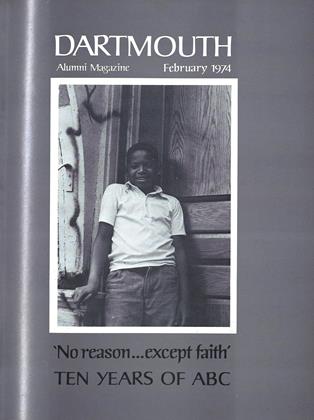By Robert C. Harvey '38.Philadelphia: The Canterbury Guild, 1973. 78pp. $1.95.
Much has been written about the decline of the Church - but in this short book the emphasis is on renewal of the Church's spiritual life by overcoming the secularism of its recent past. The title The Holy Slice refers to an imaginary diocese of the Episcopal Church and the book opens when the Diocesan Convention has been recessed because of issues that could not be resolved. The author is thereby given the opportunity to unfold the contrary viewpoints of a divided church, and he polarizes the conviction of a traditionally minded bishop, having strong pastoral concerns, with the outlook of a liberally minded, young clergy, concerned with political and social matters and identified with all sorts of worldly causes.
Since the Prayer Book is the Episcopal Church's form of worship, an opposition toward it illustrates, of course, the conflict within the Church. On this issue the clergy are represented as tending to regard it "as a sacred relic of the past" while for the bishop the Prayer Book is simply the response of a Church in its relationship with the living God." And so he asks: "What else can we do but use it?"
The national staff of the Church are characterized as secular men, "socialists in their political and economic outlook" and like liberals in every field devoid of understanding what St. Paul meant by differences in form and function. The bishop, on the other hand, thinks that "the Church is more true to its Lord when its mood is contrary to the world's than when it's in agreement."
The bishop's position is a consistent one - it is the traditional position of the Christian Church and the book is, therefore, equally meaningful to Christians who are not Episcopalians. The bishop is, consequently, opposed to Church programs which are concerned with freedom marches, college protest, the new morality. The most important things for him are, quite rightly, the Christian home and the parish. He feels that the Church is dominated by radicals who want to transform the world while he wants to transform the Church's members. And so he wants to concentrate upon his flock and wants his clergy to be on the firing line, but not to attend to paperwork, programs, and property like those clergy who hold desk jobs although they were called and ordained as priests and, therefore, should have a pastoral care of souls.
The bishop is, of course, opposed to the permissiveness of our time as it expresses itself in abortion, to the clergy's disobedience to their vows in not living the Prayer-Book life of discipline and worship, and, obviously, to the ordination of women to the priesthood.
The Reverend Dr. Lutge is a retired priest of theEpiscopal Church, still active as assistant at theChurch of the Crucifixion in New York. He isthe compiler and editor of the recent book: Sexuality, Theology, Priesthood, a symposium byAnglican, Orthodox. Roman-Catholic andProtestant authors, opposing the ordination ofwomen on theological grounds.
 View Full Issue
View Full Issue
More From This Issue
-
 Feature
Feature‘No reason... except faith' Ten Years of ABC
February 1974 By BRUCE KIMBALL -
 Feature
FeatureIn language teaching, a call for ‘madness'
February 1974 By R.B.G. -
 Article
ArticleBig Green Teams
February 1974 By JACK DEGANGE -
 Article
ArticleLatter-day Koster Man
February 1974 -
 Class Notes
Class Notes1950
February 1974 By JACQUES HARLOW, ERIC T. MILLER -
 Article
ArticleHEINZ VALTIN
February 1974 By Andrew C. Vail Memorial, R.B.G.
Books
-
 Books
BooksAlumni Articles
JUNE 1966 -
 Books
BooksTalking Sense
JAN./FEB. 1978 By CHARLES M. WILTSE -
 Books
BooksTHE MORNING NOTES OF ADELBERT AMES JR.
April 1961 By GORDON H. GLIDDON -
 Books
BooksTHE WAY OF THE GREEKS
APRIL 1930 By J. B. Stearns -
 Books
BooksTHE SUPREME COURT AND JUDICIAL REVIEW,
April 1942 By James P. Richardson '99 -
 Books
BooksGREAT ENTERPRISE: GROWTH AND BEHAVIOR OF THE BIG CORPORATION.
April 1956 By WILLIAM A. CARTER


